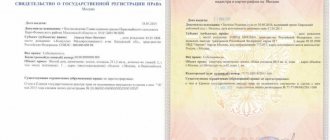What is a share (part) of a land plot?
When donating a share (part) of land, interested parties need to have an idea of what it is. Art. 6 of the Land Code of the Russian Federation (LLC RF) provides a complete list of objects of land relations, among which it distinguishes land (natural object and resource), land plots and their parts. This article not only does not disclose the concept of share, but also does not relate it to such objects. When referring to the norms of civil legislation of the Russian Federation, in particular to Art. 128 of the Civil Code of the Russian Federation, it can be seen that they also do not belong to the objects of civil rights.
Then a logical question arises about how certain transactions for the alienation of shares of property, including their donation, are carried out? The answer to this can be found by analyzing Chapter 16 of the Civil Code of the Russian Federation (provisions on common property).
In accordance with Art. 244 of the Civil Code of the Russian Federation, shared ownership means the ownership of several persons in relation to one property with the definition of the shares of each of them. It is important that it does not relate to the division of the property itself, but is a share in the right of common ownership of the land. This means that any of the owners of one land plot has the right to use it without dividing it into any parts, to the extent that it is necessary for him (if his part is not allocated - Article 11.5 of the Land Code of the Russian Federation), but he can only dispose of it his.
The determination of such shares is carried out in accordance with the rules specified in Art. 245 of the Civil Code of the Russian Federation, i.e. by agreement of the parties, or in its absence, they are recognized as equal between all co-owners. Exercising the powers specified in Art. 209 of the Civil Code of the Russian Federation, is also carried out by the co-owners of the site by mutual agreement, but there are restrictions on its disposal. In this case, it is necessary to obtain the consent of the remaining owners of the site, and when expropriating it for compensation, the rules on the pre-emptive right to purchase must be observed. This follows from Art. 246, 250 of the Civil Code of the Russian Federation.
What is the share of land according to the law?
The concept of a share can be found in the Civil Code of the Russian Federation. Article 245 of the Civil Code regulates the process of allocating a share from a common land plot owned by several citizens at once.
To understand what the concept of “share” is in relation to land plots, you must first define what shared ownership is. In relation to land plots, it can be considered as:
- part of the territory that has been identified in nature and its clear boundaries have been defined;
- cost allocated from the total cost - a specific amount that was calculated from the price of the entire land plot.
Note that the second option is applicable in cases where the law does not allow the land to be split into pieces; it must be a single whole.
The Civil Code does not provide a clear definition of this type of property, but allows for its existence and regulates the transfer of property rights of this type as a result of donations and other transactions made by citizens.
Another important document that you need to rely on when donating a land plot allocated from common shared ownership is the Land Code of the Russian Federation. The Land Code does not prohibit the donation of plots, but it does introduce restrictions on the process. The main one concerns the fact that the transfer of such property into other hands by deed of gift assumes that the new owner, according to the documents, will be considered not as the owner, but as a tenant.
Important: both the Land Code and the Civil Code do not interfere with the procedure for donating the entire plot of land or its share, but they do introduce restrictions. Each of them, under certain circumstances, can be appealed in court.
Anatoly Pysin, General Director of the TsDN agency, answers:
Since the exchange agreement, which provides for the obligation of each party to transfer one product into the ownership of the other party in exchange for another, is subject to the rules on purchase and sale (Clause I and Article 567 of the Civil Code of the Russian Federation), which fully applies to the exchange of real estate, then There is no need to analyze the barter agreement in detail within the framework of this work[114].
During the consultation, the lawyer surprised me by saying that the exchange agreement for a share of home ownership is not a document of title. According to the new legislation, it is provided by Rosreestr.
Extract from the Civil Code of the Russian Federation, the Land Code of the Russian Federation and the Federal Law “On the Turnover of Agricultural Land” the specifics of transactions for the purchase and sale of land plots, taking into account the category of land to which they belong.
Conditions for donating a share of a house and land
A number of restrictions apply to making a gift. Namely, the act of gratuitous transfer is invalid if:
- Carried out in exchange for any service, financial investment or counter-gift from the donee.
- The recipient of the gift is an employee of an educational, medical, social and other similar institution, and the donor is a citizen using the services of such an organization, his spouse or relative.
- Done in favor of a civil servant, official, employee of the Bank of Russia in connection with the performance of their official duties.
- The donor is a minor, incapacitated citizen or his representative.
- Illegal actions were established against the donor in order to force him to alienate property without compensation.
- The contract provides for a promise to make a gift in the future, after the death of the donor.
Mandatory conditions for concluding a deed of gift (including in relation to future transfer of real estate) are:
- State registration of the agreement.
- Legal capacity of the parties (if the donee is deprived of it, a legal representative - a parent or guardian - can act on his behalf).
- Availability of documents confirming the donor’s ownership of the house and land or a share of real estate.
- A clear indication in the contract of the object of the gift (size of share and name of the object).
- Conducting a preliminary assessment of the share of the plot from independent appraisers or requesting data on the value of real estate from Rosreestr (required to pay the state duty).
And an equally important condition is compliance with the rules and regulations of the procedure for drawing up a deed of gift, more about which below.
What is needed to donate a share of a plot of land?
As mentioned earlier, to alienate a share in property rights, it is enough to conclude a DD. However, this requires that the object be owned by the donor.
If there is no record about the plot in the Unified State Register of Real Estate, the owner must first:
- Coordinate the allocation with the owners of neighboring plots.
- Order surveying. The procedure is usually paid for by citizens who decide to “secede.”
- Coordinate the survey results with other owners.
- Approve the cadastral plan in the cadastral chamber.
- Conclude an agreement, register property rights in Rosreestr.
After which the owner can donate his share to any citizen or legal entity.
The difference between donating a part and the whole plot
The donation agreement for a share of a plot is almost identical to the donation of an entire plot. The main difference is that it must be clearly described which share is being donated. Accordingly, the plot should be divided into shares.
Terms of a transaction
A transaction may be considered illegal if the deed of gift of the plot in the deed of deed contains one of the following conditions:
- The share of the plot passes to the new owner after the death of the previous one. This situation must be formalized by a will.
- The donee transfers money or other material assets to the donor (or undertakes to perform a service). A gift is a gratuitous transaction from which the donor should not receive benefits.
- The donor is a minor or incapacitated.
- The recipient is the head or doctor of the medical department in which the donor is staying or being treated.
- Unless the consent of the other owners or spouse has been obtained.
- If the plot is located in the border zone, it cannot be given to people who are not citizens of Russia.
You can include the following conditions:
- if the donor survives the donee, the land will return to him;
- the share will pass to the new owner not immediately after signing, but after a certain period of time or after some event (for example, a wedding or the birth of a child).
How to make a deal and donate a share?
The owner of the land can make a deed of gift at any time during his ownership of a particular plot.
The legislator does not impose any restrictions on such an agreement, since it is gratuitous in nature (that is, the donor has no right to demand anything in return from the donee).
However, when making a deed of gift, both parties to the agreement must remember that only with the correct preparation of the entire package of documents and the development of the most convenient version of the agreement, the transfer of ownership can be legally formalized.
Preparations for registering the transfer of ownership of a plot (or its share) by donating the latter will include the following steps:
- Preparation of documents confirming the legality of the donation transaction;
- Verification of provided documents by Rosreestr employees or a notary in order to confirm their authenticity and minimize possible risks of violation of the law when concluding a gift agreement;
- Agreement by the parties to the transaction of all conditions for the transfer of real estate;
- Determining whether a share in the land plot will be allocated in its actual form or whether the use of the plot will occur on the basis of common property;
- Drawing up a gift agreement with the participation of both parties;
- Registration of transfer of ownership of real estate.
When preparing for the execution of plans for a gift in the form of land, the donor will have to work hard to minimize possible problems in challenging the legality of the agreement in the future.
To do this, it will be necessary to prepare a certain package of documents, which should include not only the standard set in the form of a personal statement, passport and technical documents for the site.
Additional, but mandatory in this case, documents will include:
- Documents confirming ownership of a specific plot (with a mandatory indication in them of the way in which it was received by the donor. This provision is necessary in order to confirm the legality of the disposal of real estate);
- The consent of the spouse to complete the transaction (it is required regardless of whether the gift is made from jointly acquired property or this property was acquired by the donor before marriage), since it will be gratuitous in nature and may lead to a deterioration in the financial condition of the family;
- Documents giving characteristics of all buildings located on the site that is transferred to another owner as a gift (technical passports, certificates of absence of arrears in payment of any bills related to these buildings, as well as confirming information about the absence of encumbrances on them) .
Be sure to read it! What does a will give for an apartment - the advantages of receiving real estate in 2020
After all the documents have been reviewed (the authorized bodies are given a period of 10 days for this), the donation agreement will be signed directly by both parties, as well as the transfer of ownership will be formalized by the new owner receiving the relevant title documents.
The alienation agreement is
As such, there is no agreement on the alienation of property, because each transaction specifies a specific type of transaction (purchase, exchange, donation). However, often these agreements do not need to be certified by a notary. But there are several cases when it is necessary to contact it:
- Selling an interest in real estate to another person (rather than other owners who have a right of first refusal).
- Sale of any real estate owned by persons under 18 years of age, as well as partially or completely incapacitated (at any age).
- Sale of a share in a land plot.
- Sale, donation and exchange (with or without additional payment) of shares in the authorized capital of an LLC.
- Disposal of real estate by guardianship authorities or on the basis of trust management.
- Rent agreements - when one person undertakes to transfer an apartment or other property into ownership after his death, and the second party constantly makes payments for the maintenance of the first (monthly).
- A lifelong maintenance agreement with a dependent - this transaction is very similar to an annuity, but instead of monthly cash receipts, a citizen must support the owner of the property and care for him until his death (and after death, receive his object as property).
About
How to draw up a donation agreement for a share of land
The donation agreement for a share of a land plot is drawn up according to the rules regulated by Ch. 32 of the Civil Code of the Russian Federation. They can be divided into general and special . Among the common ones, we highlight the following:
- compliance with the sign of gratuitousness (Article 572 of the Civil Code of the Russian Federation);
- a simple written form is required (Article 574 of the Civil Code of the Russian Federation);
- prohibition of donations on behalf of minors and incapacitated citizens (Article 575 of the Civil Code of the Russian Federation).
If these general rules are not observed by the parties to the transaction, the donation will be declared invalid (§2 of Chapter 9 of the Civil Code of the Russian Federation).
Giving involves two parties - the donor and the recipient. The object can be any property, unless it is withdrawn from civil circulation, regardless of cost. In addition to the above, such an agreement may contain conditions precedent for the transfer of the plot to another person (consensual agreement) or contain conditions on legal succession.
Example
Conditions precedent for donating a plot of land include the wedding of the donee, the birth of a child, etc.
Special requirements for registering a donation of a share of a land plot include the following:
- The presence of the will of one party to transfer a gift, and the other to accept it.
- The transfer of ownership of a share of a land plot is subject to state registration in accordance with the requirements of Art. 25 of the Land Code of the Russian Federation, Federal Law No. 122-FZ of July 21, 1997 “On state registration of rights to real estate and transactions with it.”
- The object of the donation - a share of a land plot - involves indicating the characteristics, in particular the address of its location, cadastral number, the total area of the entire plot, the size of the transferred share (if possible, its area), type of permitted use, category of land, reference to the donor's title documents, indication for buildings, if any.
- The deed of gift must determine the value of the transferred share of the plot.
- A reference to the presence or absence of restrictions, encumbrances, or prohibitions on it.
- The possibility of the parties to unilaterally terminate the contract (Articles 573, 577, 578 of the Civil Code of the Russian Federation).
In order for all of the above conditions to be determined by the deed of gift when it is executed independently, it is necessary to adhere to a certain structure , in which the following components can be distinguished:
- name (donation agreement for a share of land);
- date and place of his imprisonment (preferably in words);
- preamble (name of the parties to the transaction, information about them - full name, place of residence and registration, passport details);
- subject of the contract;
- rights and obligations of the parties;
- special conditions;
- final and transitional provisions;
- signatures.
How to draw up a contract correctly
The law establishes the rules of donation, including Art. 575 of the Civil Code of the Russian Federation. A prerequisite is a written form of the contract, certified by a notary office. The fact of transfer of rights must be registered in Rosreestr.
The donor must meet the following requirements:
- An adult capable citizen. An adult incapacitated or partially capable citizen, as well as children under 18 years of age, cannot act as a donor. Gratuitous transactions on behalf of such donors are considered void.
- The share in the ownership of the land plot is owned by the donor. If the title documents are not properly executed, then the transfer of rights is impossible.
- The object is under arrest. Bailiffs can seize or encumber part of a land plot if enforcement proceedings have been initiated against the owner or as an interim measure pending trial. Until the encumbrance is lifted, registration activities with the object are prohibited.
A peculiarity of the transfer of a share of a land plot as a gift is that the recipient has rights only to this part.
He does not have the ability to dispose of the entire object. And subsequent sales are possible only after satisfaction of the rights of shareholders to pre-emptive redemption.
Sample agreement for donation of a share of a residential building and a share of a land plot
Real estate exchange agreement
Under an exchange agreement, the exchanged objects are assumed to be of equal value. If the parties evaluate them as unequal, then the party to the contract providing an object of lower value undertakes to pay the difference in prices to the other party.
Ownership of real estate objects under an exchange agreement transfers from the moment of registration of ownership in the Office of the Federal Service for State Registration, Cadastre and Cartography for Moscow (Rosreestr Office for Moscow).
10.
How to draw up a deed of gift for a share of land
The procedure for registering a deed of gift for a share in a land plot is almost identical to the registration of a gift for a land plot as a whole.
Conditions for donating a part:
- Registration in a notary office and state registration in Rosreestr. If a citizen wishes to donate a share of land, the contract is drawn up through a notary. The responsibility for transferring documents to Rosreestr in 2020 rests with the notary.
- No payment for share. A mandatory condition of the transaction is that it is free of charge. It is prohibited to demand the gift of money or reciprocal services for the object. If the parties draw up a deed of gift in order to hide the purchase and sale agreement, then the transaction can be challenged in court.
- Obtaining rights to a part during the lifetime of the former owner. Registration of a deed of gift is an alternative to a will. A feature of a gift contract is that the recipient’s rights arise from the moment of state registration during the life of the donor.
- Voluntariness. Each party must enter into the transaction in good faith.
- The subject of the donation must be a specific object. The share must be allocated (1/2, 1/3, ¼). And the land plot must be officially registered (borders are defined and registered in the cadastral register).
Where to start the process?
Registration of a gift for a share of land is in writing. However, two circumstances need to be taken into account:
- donation through a notary – suitable if the land has already been divided into shares, one of which goes to the donee;
- donation directly through the MFC or Rosreestr - if the owner of the land transfers a part to his relative, i.e. there are no other shareholders.
Step-by-step algorithm for donating a share
The following stages are distinguished for donating a share of a land plot (to a relative):
- Initial meeting with the donee, discussion of the details of the transaction, conditions and requirements.
- Appointment with a notary, consultation, drafting a gift agreement.
- Preparation of documents for land, formation of a package, second application to a notary.
- Payment of state duty, registration of a deed of gift for a share of the land plot.
- Drawing up an act of acceptance and transfer of the object (at the request of the parties).
- Contacting “My Documents” (MFC) or Rosreestr, obtaining an extract from the Unified State Register of Real Estate on state registration of ownership of a share of the plot.
Documentation
Information from the documents will be included in the deed of gift for the land share. Find out from the notary what documents are needed and collect a list of them.
Standard list:
- copies + originals of passports;
- an extract from Rosreestr with cadastral data and/or a cadastral passport for the land plot;
- an extract from the Unified State Register of Real Estate or a certificate of ownership - indicates who owns the land and on what basis;
- consent of the second spouse - if the share relates to the jointly acquired property of the husband and wife;
- applications from applicants;
- ready-made donation agreements – for Rosreestr.
Please note that the documents for a notary and for the MFC or Rosreestr may differ, but in general the standard package is sufficient.
Deadlines
Lawyers are often asked how long it takes to donate a share of land to one of your relatives? Theoretically, the preparation of a deed of gift takes 1-2 days, it all depends on the notary’s work schedule and the wishes of the parties.
Making changes to the state register will require waiting from 7 to 14 days , not counting holidays and weekends. If you submit an application by mail, the wait for an extract from the Unified State Register will increase by 4-5 days - the period for sending attachments.
Cost, taxes, expenses
Drawing up a share donation agreement is a paid notary service. Even if you draw up the project yourself, the notary will charge a state fee for certifying the agreement.
Prices for notary services:
- legal and technical work – from 700 to 5,000 rubles;
- single state duty – 0.5% of the transaction amount, i.e. from the price of the donated share of the land plot (for example, if the cost of the share is 125,000 rubles, the notary will charge 625 rubles in state duty);
- The state duty for registering a transaction is 350 rubles per share of a land plot or 100 rubles for agricultural land (Article 333.33 of the Tax Code of the Russian Federation).
Both the donee and the donor can pay the expenses, but if children are involved in the transaction, the state duty is not paid.
The main advantage when giving a gift to a relative is the absence of a tax levy . If a transaction is not a close relative, he pays personal income tax in the amount of 13% of the value of the share. Relatives, which belong to the category of close people to the donor, are exempt from tax (clause 18.1 of Article 217 of the Tax Code of the Russian Federation). They have to prove their status by presenting a birth certificate, marriage certificate, adoption certificate, etc.
Example:
The businessman Kuravlev decided to donate the land to his relatives. Having decided on the candidates, the donor began to prepare documents and draw up deeds of gift. In total, it was decided to formalize the donation for 3 relatives: brother, aunt and spouse. Kuravlev owned ½ part of the land plot, of which he wanted to give ¾ part to his relatives, and keep ⅛ share for himself.
The parties agreed on a deal, visited a notary and began to calculate the amount of tax. According to the provisions of Art. 217 of the Tax Code of the Russian Federation, Kuravlev’s wife and brother do not pay income tax. The native aunt is a relative of the donor, but not close, but distant. Consequently, she is not exempt from personal income tax - the aunt must pay 13% of the ⅛ share she received under a gift agreement from her nephew (Kuravlev).
Notarization of the transaction
Is it necessary to have a contract for the alienation of a share in an apartment certified by a notary? Photo No. 5
Since January 2020, the alienation of shares in an apartment without notarial participation is impossible (Article 24, Federal Law 122). Initially, owners were required to certify agreements between third parties. However, since January 2020, any transaction of shared alienation is carried out with notary support.
The specialist carries out:
- legal examination of submitted documents;
- drawing up an agreement, registering a purchase and sale transaction;
- related technical work to support the transaction (requests to government and other authorities, printing, copying of documents).
Changing the mechanism of equity transactions increases the costs of citizens: state duty, payment for the work of a notary. But the degree of legal security of such transactions is higher.
Is it possible to challenge such a deed of gift and how to do it?
If the deed of gift contains one of the illegal conditions, it can be challenged.
You can also cancel it if:
- The donee committed a crime against the donor. If the latter died, his heirs can take care of this.
- A deed of gift contains a promise to donate a share in the future. By this time, the donor’s financial condition had deteriorated greatly. For example, he lost his job, became seriously ill, became disabled, etc.
To do this, you will have to go to court at the location of the land. A statement of claim must be filed. It should indicate in detail why the deed of gift should be declared invalid and attach evidence. The defendant will be the donee.
Share in an apartment – owner without a specific territory
How to identify the natural value of the real estate share?
When talking about apartment shares, it is important to understand that property is its legally separated parts.
The right is confirmed by documents indicating the property with a fractional number: 1/2, 2/4, 1/5, etc.
It is often difficult to delimit shares geographically and determine the part in kind. For example, a studio layout, a one-room apartment, several co-owners of a multi-room apartment.
Here real battles are played out between copyright holders, when only the court is able to resolve the situation with the allocation of property to each participant.
But the main feature of “sharing” is the restrictions on the individual disposal of part of the property.
Cancellation of deed of gift for a share of land
Cancellation of a DD is possible after the death of the donee, if the condition is specified in the document.
Be sure to read it! Who are considered disabled children of the testator?
There are other grounds for annulment of a transaction in court:
- the donor signed the agreement under the influence of blackmail, threats, psychological or physical violence;
- the former owner did not understand the consequences of the transaction, was incapacitated or had limited legal capacity at the time of signing the DD;
- the donee made an attempt on the life and health of the donor and his relatives.
The heirs of the donor who died due to the fault of the donee also have the right to demand cancellation. A court verdict that has entered into force will be required. This right is also granted to creditors of the former owner of the share if it was purchased within six months from the date the bankruptcy decision entered into legal force, and the donated land was purchased with money from business activities.
Important! According to Art. 35 of the RF IC, the spouse of the donor has the right to demand the cancellation of the DD if the share was donated without his consent certified by a notary. The statement of claim must be filed within 12 months from the moment the illegal transaction became known.
Is it possible to alienate a share of an apartment...
The rules on purchase and sale (Chapter 30) are applied to the exchange agreement, if this does not contradict the rules of this chapter and the essence of the exchange. In this case, each of the parties is recognized as the seller of the goods, which it undertakes to transfer, and the buyer of the goods, which it undertakes to accept in exchange*.”
According to the fair remark of V.A. Lapach, when exchanging real estate, there is “...direct equating to each other the objective-material characteristics of objects (use values), but not exchange values as the economic qualities of goods with their reflection in the price...” Lapach V. A. System of objects of civil rights: Theory and arbitrage practice. St. Petersburg, 2002. P. 504..
The subject of the agreement for the exchange of residential premises on both sides is individually defined real estate. This circumstance significantly distinguishes the specified legal relationship from the corresponding type of sale and purchase, in which the obligation arises regarding the transfer of an individually defined thing on the one hand in exchange for a cash equivalent on the other. Most often, the notary simply does not know about this. However, there may be cases when a notary can draw a conclusion about significant investments that have significantly increased the value of the alienated real estate on the basis of the documents presented to him. For example, the notary is presented with documents on the ownership of a residential building acquired by one of the spouses before marriage.
Deed of gift for a share of land and a share of a house
Most often, when making transactions based on the alienation of a land plot or its share, part of the house or the entire house is donated along with the land. These are buildings located on the territory of the deed of gift. In such cases, the contract must contain a detailed description of each property separately. When contacting Rosreestr, each type of property will be registered separately.
If the deed of gift includes two alienable objects of property: a building and a land plot, the following should be indicated:
- Location: the address where the donated items are located.
- The square footage of the structure and the dimensions of the plot.
- The material from which a house and other structures are built.
- The height of buildings located on alienated land.
- Indication of the sizes of areas considered as residential and non-residential (separately).
According to the law, the donor and donee have the right to introduce clauses into the contract at their discretion. The main thing is that everything that is written in it does not contradict the articles of Russian law.
Does it make a difference what to give - a plot with or without a house?
During the transaction, the difference is whether the plot will be with buildings or without
there are none. However, at the stage of preparing documents, it will be much easier to prepare for transfer a site on which there are no buildings, since you will not have to prepare additional documents regarding each of them. In addition, buildings may be subject to encumbrances in the form of a ban on demolition or mandatory reconstruction.
If there are buildings on the site, in addition to preparing technical documents for them, you will also have to obtain the consent of the spouse (if any) to donate each piece of real estate separately. In addition, when paying tax on a gift, you will have to pay not only for the land , but also for buildings (based on the cadastral value of each of them).
Another difference in donating a plot with and without buildings is that when the deed of gift is certified by a notary, the calculation of the latter’s services will be based on the cost of the plot. If there are buildings on it, this amount will be higher, and accordingly, the cost of the notary’s work will increase.
Basic package of documents for the seller
According to the requirements established by law, such agreements are concluded in writing (clause 3 of article 574, clause 2 of article 567, article 550 of the Civil Code of the Russian Federation).
It should be understood that only the area of living rooms is subject to division and only if the share is not insignificant relative to the living area of the apartment. For example, if a two-room apartment is owned by 2 owners with equal share rights, the order of use can be determined so that each gets a room.
In addition, shares appear when dividing the common joint property of former spouses or for other reasons in which the basis of ownership is a court decision.
Confirmation of solvency - namely the fact that the plaintiff had money to buy the neighbors' shares, which is half of the apartment - according to the Supreme Court, was also important for the correct resolution of the dispute. In our story, for some reason the court wasn’t even interested in the neighbor’s solvency.
Donating a share of land to a relative
The law allows the transfer of real estate as a gift to any citizens, both related to the donor and completely strangers to him. Practice shows that in the vast majority of cases, real estate is alienated in gratuitous transactions in favor of those whom they love and trust.
The procedure for giving gifts to relatives and strangers is practically no different. The only difference is the need to indicate the degree of relationship of the parties in the gift.
Important: if property is alienated in favor of a close relative, the latter is exempt by law from the need to pay personal income tax.
The legislation grants the status of a close relative to:
- full-, half- and adopted children;
- husbands and wives;
- parents;
- adoptive parents;
- grandparents;
- grandchildren;
- sisters and brothers, full and half.
A degree of relationship not included in the list means that the recipient is obliged to pay 13% of the income received as a result of the gift to the country’s treasury.
What are the features of a share in an apartment as an object of ownership and the procedure for its alienation?
When several owners own an apartment in shares, real estate alienation transactions are characterized by a number of features. Let us consider the main points and conclusions of such agreements in 2017.
From a legal point of view, the alienation of a share of real estate is understood as a transaction associated with the transfer of ownership rights or ownership to another person. This can be a gift, exchange, purchase and sale, or almost any transaction allowed by law in the field of real estate. The owner re-registers the property right to another person according to the established legal mechanism.
If the deed of gift is issued for a minor child
The alienation of real estate in favor of a citizen who has not reached the age of majority also has its own characteristics. By law, minors cannot put their signature on deeds of gift and other documents. They retain the right to act as recipients, however, legal representatives must sign and perform other actions to receive the gift. These could be parents, guardians, adoptive parents or guardianship officials.
The child's representative signs the deed of gift. His data, as well as the data of the donee, are entered into this document. If the minor is not a close relative of the donor, the representative is responsible for paying personal income tax and filing a return with the tax office.
Alienation of property of a minor
If a citizen is under 18 years of age, the law provides for special conditions and procedures for the alienation (sale, exchange, donation) of real and movable property. If a child has been declared incompetent fully or partially, then in any case only a legal representative will act on his behalf:
- parents;
- adoptive parents;
- guardians;
- representatives of guardianship authorities.
If the child is capable, then there are 2 options depending on his age:
- If he is under 14 years old, then only legal representatives act on his behalf (that is, he does not participate in the transaction itself - his signature and personal presence are not required).
- If he is between 14 and 17 years old (inclusive), then he is independently present at the transaction and signs, but only in the presence and with the consent of his parents (or other legal representatives).
Moreover, in any of the above cases, parents must first contact the guardianship authorities and obtain their written consent to carry out the operation. For example, if we are talking about selling an apartment, the guardianship authorities must make sure that the consequences will not cause harm to the child.
Typically, a permit is issued fairly quickly, provided that the minor’s living conditions have obviously improved as a result of the transaction:
- moving to a larger settlement (from a village to a city);
- purchasing an apartment or house with a larger area;
- purchasing an apartment with communal conditions (moving from a poorly equipped private house).
In other cases, guardianship may require additional evidence to certify that the decision to sell the apartment really is in the interests of the minor: for example, moving to a rural area will have a beneficial effect on his health (medical certificates and reports will be needed).
Who can you donate a share to?
The recipient can be any individual or legal entity. However, popular recipients of a share of land as a gift are relatives or charitable organizations.
Civil law applies to close relatives:
- spouses (during official marriage);
- parents (officially established);
- adoptive parents;
- children (officially established);
- adopted children;
- brothers and sisters (half- and half-brothers);
- grandparents;
- grandchildren.
Among legal entities, popular recipients of a part of a land plot as a gift are:
- animal shelters;
- charitable foundations.
Alienation in favor of the former spouse
According to the law, former spouses do not fall into the category of relatives. After the official breakup, these are strangers. However, the married couple managed to acquire common property, which must be fairly divided. Shares in a joint apartment are allocated, after which it is possible to alienate the property in parts both between divorcees and in favor of third parties.
In legal terms, one must rely on the norms for concluding contracts between strangers.
Expert lawyer's opinion
Expert opinion Ekaterina Vladimirovna Gumenyuk
Rosreestr - worked as a state registrar of rights. Head of the property department. I help solve problems that arise with real estate.
Ask a question There are situations when spouses acquire residential premises or any other piece of real estate as joint property, that is, shares are not allocated to each spouse.
The law allows this type of property if the property is acquired during marriage. If the parties agree and there are no material claims against each other, it is possible to redistribute shares by concluding an agreement.
In this agreement, the party who remains the property is assigned a whole share of 100%, and the other party 0%.
Rights obtained under the concluded agreement are also subject to state registration.
This is interesting: Final payment under the contract: which method to choose so as not to be left with nothing
Is it necessary to have a deed of donation of a share of a land plot certified by a notary?
In 2020, citizens preparing a deed of gift may not need to contact a notary. There is no need for notarization of the document. The main thing is that it contains all the signatures and points provided for by regulations.
Since the alienation of a land plot is a rather specific transaction, it is recommended to involve a notary in the process and pay all required fees. This will help avoid problems in the future.
In legal practice, there are often situations when the donor changes his mind about giving his property into the wrong hands and destroys his copy of the deed of gift, declaring the donee’s copy to be a fake. When contacting a notary, you always leave a third copy in the notary’s office, which will serve as proof that the transaction actually took place.
Another advantage of contacting a notary office is that the specialist will definitely check:
- whether both parties to the procedure are competent;
- whether it is carried out out of good will;
- whether pressure was exerted on the donor;
- correctness of the donation agreement.
At a notary office you can order the service of drawing up a deed of gift and express your wishes to the specialist. He will formulate them in legal language. The parties to the transaction will only have to sign the document.
The only drawback of using a notary is that the services of a lawyer of this specialization are quite expensive.
What to look for when buying and selling an apartment
Lucky) In general, it would be a good idea to push back the date for the entry into force of such innovations by at least a month, to make announcements in the same MFCs and departments of Rosreestr. And don’t throw it away day after day, write it to the RG and assume that everything is in order. Again, our notary only found out about the changes yesterday.
The transfer of ownership of real estate under a real estate sale agreement to the buyer is subject to state registration*.
Other contracts for the alienation of property can be concluded both in notarial and in simple written form.
The current legislation devotes only a small number of rules to the exchange agreement, explaining this by the fact that the rules on purchase and sale are applied to the exchange accordingly (clause 2 of Article 567 of the Civil Code).
If a share in the right of common ownership is sold to one of the participants in the common property, then the owner alienating his share does not need to provide evidence of notifying the other participants in the common property about the sale of the share. The right to select a purchaser from among the co-owners belongs to the seller himself. Each Party guarantees that it is the owner of the property transferred by it, which is not in dispute or under arrest, is not the subject of a pledge and is not encumbered by other rights of third parties.
Arbitrage practice
Challenging a deed of gift for real estate is problematic: irrefutable evidence is needed that will convince the court that there are grounds to invalidate the transaction and return the donated property to the donor.
In most cases, the demands remain unsatisfied, but there are also examples of solutions where people managed to get the contract canceled:
- Decision No. 2-1209/2017 2-1209/2017~M-1163/2017 M-1163/2017 dated June 20, 2020 in case No. 2-1209/2017;
- Decision No. 2-1168/2017 2-1168/2017~M-818/2017 M-818/2017 dated May 29, 2020 in case No. 2-1168/2017;
- Decision No. 2-3103/2016 dated September 30, 2020 in case No. 2-3103/2016.
If you want to challenge the DD in court, you need to collect maximum evidence confirming the existence of grounds. But this does not guarantee a positive result - each situation is considered by the courts individually.
Alienation of a share in the right of common ownership of real estate
The inventory estimate of the ___________ share of the specified apartment is ______ (____________) rubles.
Well, since you are aware of everything, your comment is not clear; naturally, it is noticeable if in writing you pay only for technical work on plain paper rather than on forms.
If there is no agreement between the participants on the method and conditions for the division of common property or the allocation of a share, the issue is resolved in court. Thus, when selling a room in a communal apartment, tenants of other rooms in a communal apartment do not have a preemptive right to purchase this room, since such an apartment has already been divided between the residents in kind and the rules on common shared ownership do not apply to such apartments.
Question answer
Can I draw up an agreement to donate a share of a land plot to a distant relative without the consent of the owners of other shares.
Yes, you have this right. When donating, you do not need to comply with the requirements of Art. 250 Civil Code of the Russian Federation.
How can I donate a house to my mother if the land on which it is located is municipal? Do I have to purchase it as my property to register a deed of gift for the house?
You do not need to purchase land to donate a home. In this case, a transaction is made in relation to the house, and the right to use the land plot that you had passes to the new owner of the house.
The law on “rubber” apartments – amendments to the legislation have been adopted!
For example, a three-room apartment located on the outskirts of the city, of lower cost, changes to a two-room apartment in the city center of higher cost. Recognition of counter benefits as equivalent here is achieved through a subjective assessment of the consumer qualities of the thing, taking into account the specific circumstances of the case.
This fact alone is not sufficient to establish that the parties entered into an agreement in respect of unequal goods. A correct assessment of the relations that have developed between the parties can be given only after clarifying the will of the parties on the issue raised.” Bulletin of the Supreme Arbitration Court of the Russian Federation. 2003. No. 1. P. 76-77..
The seller of a share is obliged to notify in writing the other participants in shared ownership of his intention to sell his share to an outsider, indicating the price and other conditions under which he sells it.
M.I. Baru, considering the features of compensated transactions in civil law, drew a clear line between compensation and equivalence: “Both compensation and equivalence presuppose the quantitative comparability of the goods exchanged, but in the first case the proportions are indifferent, in the second they are equal.” Baru M.I. Compensation and gratuitousness in Soviet civil law: Author's abstract. dis. ... Doctor of Law. Sci.
Under a purchase and sale agreement, the seller undertakes to transfer ownership of something to the buyer, and the buyer is obliged to pay the seller a certain amount of money for this, in other words, the price.









